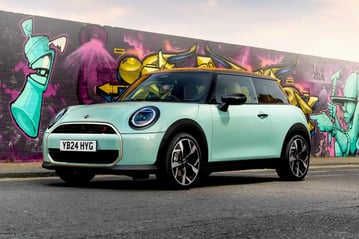- Carmoola
- Blog
- Cars and Gadgets
- Do Electric Cars Charge While Driving?
- 🗞 Cars and Gadgets
- Last updated: Sep 21, 2022
- 9 Min Read
Do Electric Cars Charge While Driving?
Written by

Verified by


See how much you can borrow in 60 seconds
| Representative Example | |
|---|---|
| Loan amount | £10,000 |
| Interest rate | 13.9% APR |
| 54 payments of | £246 |
| Total cost of credit | £3,284 |
| Option to purchase fee | £1 |
| Total payable | £13,285 |
Yay! Amazing news! You have purchased your first electric car. 😃 🍃 You’re starting to get the hang of things, and even though it’s a lot to get used to, soon, it will all feel natural. However, you’re wondering - can electric cars charge while driving?
The short answer to the question is no. Electric cars are currently unable to be charged while in motion. This is due to the fact that you must manually put your electric car into a charging port if you want to charge it. Depending on the size of the battery and the amount of charge required, electric vehicles can take anywhere from 30 minutes and several hours to charge.
Although technology has come a long way over the years, electric vehicles cannot currently be charged while being driven. But if you have heard rumours about electric cars charging while driving, it is probably because some EVs will charge a little when you apply the brakes. In this article, we’re going to be discussing recharging electric cars while driving. Let’s dive right in. 😎
Can an Electric Car Charge While Driving?
Let’s cut to the chase: no, at the moment, unlike some hybrid vehicles, fully electric cars are not capable of driving and charging at the same time. That’s because an electric car needs to be plugged into a charging station in order to charge. Though the technology is absolutely impressive, it’s not yet at a point where it offers the option of charging at the same time as driving.
When you’re driving a normal gas car, the alternator will charge the battery. That’s why your local mechanic will advise you to keep driving after a jump. The battery receives power from the alternator, which generates current and returns it to it. So driving your car will charge the battery as you drive it.
However, when it comes to electric cars, things are entirely different. The design of electric cars differs from that of gas-powered cars. Since there is no engine, no mechanical energy can be used. That’s why the only way to charge an electric car, for now, is to plug it into a charging station or a plug in your home. It can take EVs anywhere from half an hour to a few hours to charge up fully, depending on their battery size.
Can Electric Cars Charge While Braking?
As we previously mentioned and stated in our article about the best EV facts, some electric cars charge when they brake. The first people to create this technology was the American Motor Car company, in 1967, with the Amitron model. Then, Toyota started using the technology for their own Prius models.
This works by using kinetic energy to create a charge and is widely used in different types of electric and hybrid vehicles nowadays. There’s a battery in these EVs that powers the motor, which then generates a rotational force which in turn makes the wheels go around. The energy from that force is reserved and sent back into the battery - the only thing the driver needs to do is to press on the brake pedal or even lift their foot off the accelerator.
The Future of EV Charging
Though it isn’t possible for your electric car to charge while driving at the moment, it’s likely that it will be possible soon. New technologies are being developed at the very minute to make this sort of charging possible, as well as alternative ways to speed up charging.
The use of metal plates on the highways is one method of making the dream a reality. Such technology is now being developed by experts at Cornell University, who would like to release the concept within the next five to ten years. It involves a metal-plated lane that is added to highways which EV drivers can move to if they need a bit of (quite literally) on-the-go charging.
The Self-Charging Car
A self-charging electric car, often referred to as a self-charging hybrid vehicle, powers itself as you drive it by using regenerative braking. Regenerative braking is a force produced as the automobile slows down so that it can charge its own battery using a combination of traditional fuel and EV technologies. This eliminates the need to charge the car while you are at home and lowers the possibility that you will ever run out of battery power while driving.
Self-charging cars may be a suitable compromise if you can't have an electric charging station at your home. They are also useful for better acceleration power. Expect to accelerate more quickly and have more precise steering. The drawback is that you might need to apply more force to your brakes in order to stop your self-charging EV.
How to Charge Your Electric Car Now
Charging Your EV at Public Charge Points
You can charge your car at the majority of public EV charging stations in the UK by simply plugging in the connector, signing onto your smartphone, using a contactless card, or using a charge card. You can read our in-depth article to learn more about the different methods to pay for your EV charge. UK Depending on the type of charge point you choose to use, such as quick, rapid, or ultra-rapid charging, electric vehicles can be charged at public charge stations using either tethered or untethered wires.
Charging Your Electric Car on the Street
Fun fact: there are more electric vehicle charging points than petrol stations in the UK. You can find them anywhere, from car parks to shopping centres, supermarkets, petrol stations, and random streets throughout the country. In fact, in May 2020, there were a total of 31,737 charging points throughout 11,377 different locations in the UK.
There are also many public EV networks for charging around the country. Polar is the largest, and you can access charge points through their app or membership card with a pay-as-you-go subscription. There is also Ecotricity which uses an app to control the charge, and of course, Tesla with their Superchargers.
Charging Your EV at Home
The best method to keep costs down is likely to be charging your EV at home. For a full charge, charging your electric car at home will typically cost you less than £15 in total, depending on your tariff and the current cost of electricity, of course! It's a great idea to charge your car every night before bed so that you can get up in the morning with a full battery.
This is the least expensive method of charging your car, assuming you can find an electricity plan that works for your EV. Instead of paying the standard 34p kWh tariff (as of October 2022), companies like Octopus, Ovo, and EDF have EV tariffs you can benefit from, although you might find it hard to subscribe if you aren’t an existing customer.
It costs around £800 to set up a home charge point, but you can currently get a grant from the OLEV (the Office for Low Emission Vehicles) under the Electric Vehicle Homecharge Scheme for a maximum amount of £350. You might also be eligible if you own an electric car and have off-street parking.
Charge Your Electric Car While You’re at Work
Many commuters who live far from their workplace use work charging stations to make up for the trip. If you find that your place of work doesn’t yet have an EV charging point set up, you could suggest they use the Workplace Charging Scheme (WCS). It offers a contribution towards the costs of buying and installing EV charge points for a maximum of 20 sockets and capping the amount at £300 per socket. Your employer can apply for a voucher online.
How Long Does It Take to Charge an EV?
An EV can be charged in as little as 30 minutes and as much as 8 to 10 hours. The size of your electric vehicle's battery, the number of miles you travel between charges, your charging habits, and the power rating of the charger you're using all affect how long it takes to charge the vehicle. It’s also important to bear in mind that there are three different types of EV charge points:
- Slow charge points, which are the least expensive to use and are ideal for long-term parking situations, including overnight or during work hours.
- Quick charge points, which are perfect for parking your EV for a few hours.
- Rapid charging points, which are the quickest way to recharge an EV: they will usually recharge your electric car to 80% in around 30 minutes. Rapid charge points, on the other hand, cannot be installed in homes and are usually the most expensive to use.
The Bottom Line
Having an electric car is an amazing experience. First of all, it’s better for the environment. You also won’t have to worry about congestion charges if you want to drive in London, for example. They cost unbelievably less to run, and you’ll be able to benefit from renewable energy tariffs when charging your car. You may be able to get government subsidies and free parking, as well as much less noise pollution and more money when you sell.
Here at Carmoola, we’re passionate about helping people get their dream car. So, if an electric vehicle is what floats your boat, get in touch with us, and we'll help make buying one easy for you! We'd love to help you get your dream car.
Check out the Carmoola blog brimming with resources about car finance and EVs, plus a handy app you can use to get the car financing you need to make the purchase more affordable. Download Carmoola now and get an instant decision on your car finance. Cheers! 🚗😊
See how much you can borrow in 60 seconds
| Representative Example | |
|---|---|
| Loan amount | £10,000 |
| Interest rate | 13.9% APR |
| 54 payments of | £246 |
| Total cost of credit | £3,284 |
| Option to purchase fee | £1 |
| Total payable | £13,285 |
Related articles
What Are the Top 5 Used Car Websites in the UK?
Thanks to the internet, searching for a used car in the UK is easier than ever before. You can simply head online, visit a used...
What Is GMFV in PCP Car Finance? Guaranteed Minimum Future Value Explained
GMFV, or Guaranteed Minimum Future Value, is the amount your lender estimates your car will be worth at the end of your PCP...
Does Financing a Car Build Your Credit?
Financing a car can build credit when you make payments on time, but it can damage your score if you miss payments or take on...

.webp?width=832&height=592&name=customer-support%20(1).webp)










.webp?width=400&height=285&name=online-shoppers-with-dog%20(1).webp)


.jpg?width=500&height=356&name=Vintage%20car%20going%20to%20an%20old%20town-1%20(1).jpg)





